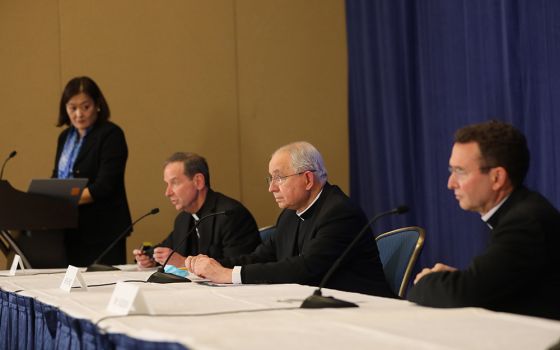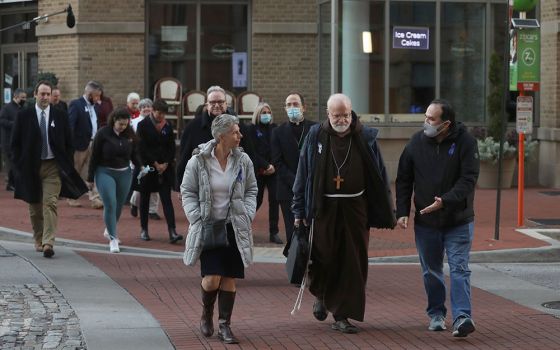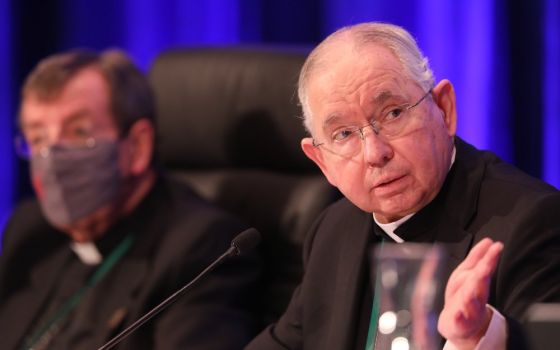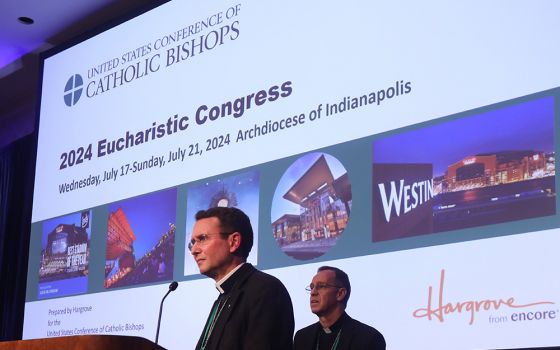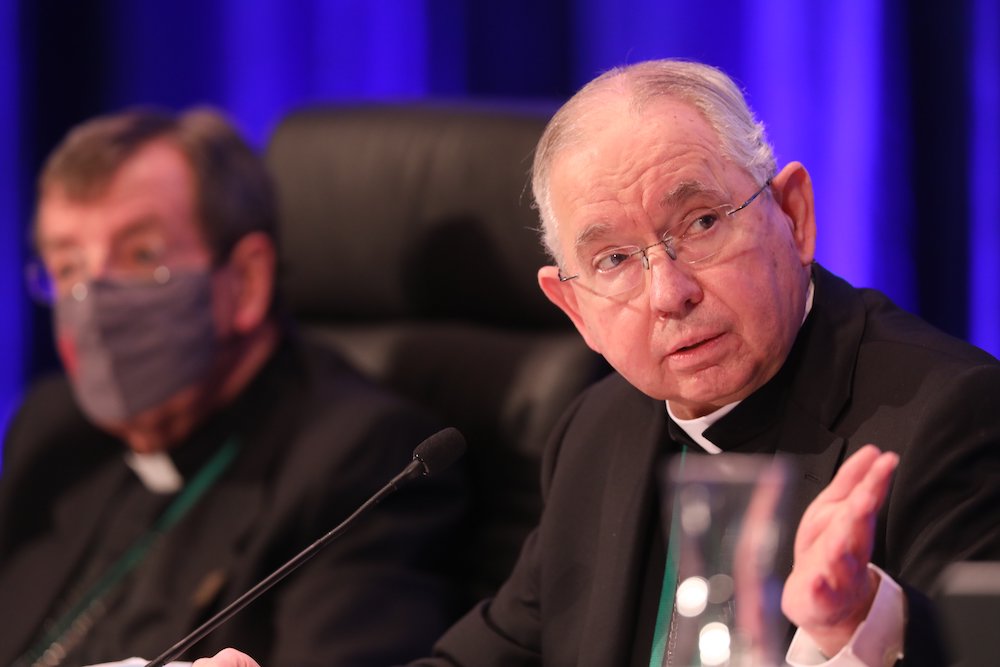
Archbishop José Gomez of Los Angeles, president of the U.S. Conference of Catholic Bishops, gestures alongside Detroit Archbishop Allen Vigneron, vice president, during a Nov. 17 session of the bishops' fall general assembly in Baltimore. (CNS/Bob Roller)
At their fall general assembly, the U.S. bishops finally passed, by a vote of 222-8 with three abstentions, the much-talked-about document on "eucharistic coherence," originally designed to address the problem of a pro-choice Catholic president after the election of Joe Biden.
Last June, when some U.S. bishops were already trying to spin the document away from an emphasis on denying pro-choice politicians Communion, guests on an EWTN talk show complained that failure to take on this issue would result in the bishops losing all credibility.
"If they do nothing, if they produce a document that could have been produced before this whole thing started, and says nothing special about [pro-choice politicians], then it really will be a defeat for the church," Fr. Gerald Murray, a member of the so-called "Papal Posse," told host Raymond Arroyo on "The World Over."
Five months later, the plan seems to be to pretend that the document never had anything to do with politicians — despite mounds of evidence to the contrary, including from the bishops themselves.
And many on the right have gotten on board with the alternative storyline that this document was part of a broader effort of "eucharistic revival," a plan for local and national events that the bishops passed separately at their November meeting.
Not surprisingly, the bishops blame the media for making this about Biden. How unimaginative.
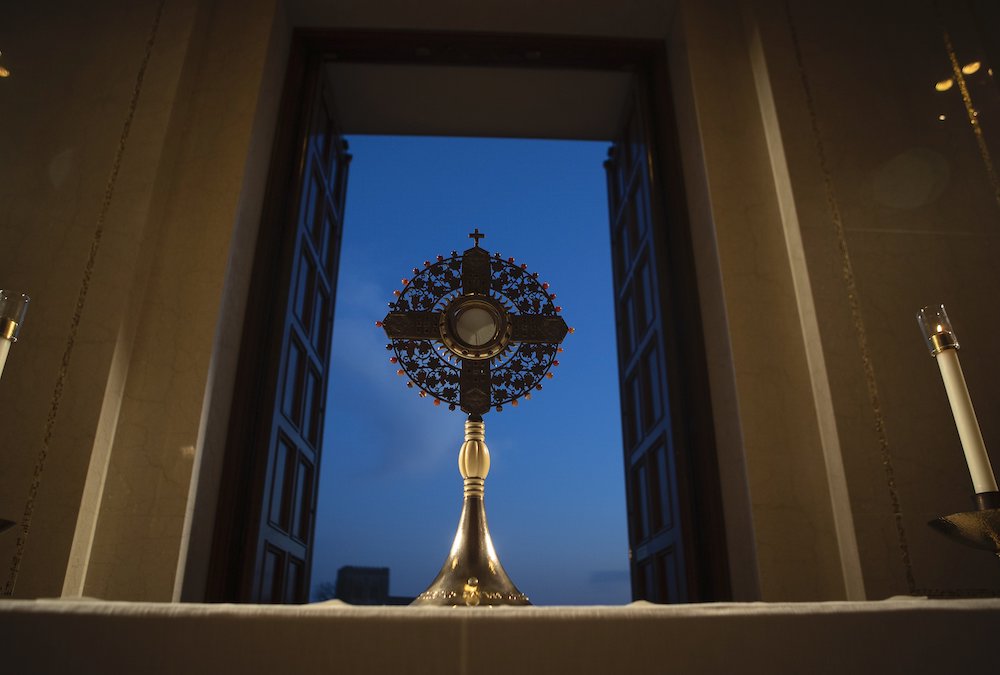
A monstrance holding the Blessed Sacrament for eucharistic adoration is seen at the Basilica of the National Shrine of the Immaculate Conception March 11 in Washington. (CNS/Tyler Orsburn)
Conservative Catholic columnist George Weigel, writing the week before the November meeting, blames the "mainstream press that has consistently misrepresented what the bishops are doing" and maintains that this document is merely part of "the bishops' eagerness to reignite eucharistic vitality and reverence throughout the Church."
Yet, Weigel adds, "Eucharistic revitalization will be seriously impeded, however, if the bishops do not forthrightly address the reception of Holy Communion by those who are not in full communion with the Church."
And outside the hotel where the bishops were meeting Nov. 15-17, protesters at the "Bishops: Enough is Enough" event organized by the right-wing media outlet Church Militant were more blunt: Signs and speakers called the bishops "monsters in miters" and a "wretched hive of scum and villainy" for a variety of failures, including backing off from the original intention of the eucharistic coherence document.
"Do you see the scandal that it is to the world that you bishops are not utilizing the full magnitude of your moral authority and influence to end this ongoing daily mass murder?" Jim Havens, an organizer of the National Men's March to End Abortion that took place Nov. 15 in Baltimore, told the Church Militant crowd.
So the fact that the bishops passed, without much fanfare, a bland document that for the most part ignores the issue of politicians and Communion will likely be seen by many on the right as capitulation and a loss. And progressives could rack it up as a win.
Except that it's not a win by any stretch of the imagination.
Advertisement
It's not a win for the U.S. bishops, who remain deeply divided despite their largely successful attempts to stay on message with the "this was never about politicians" angle.
It's not a win for the church, which has suffered through a year of bad PR that has painted Catholicism as just one more cog in the culture war.
It's not a win for all those issues that the bishops could have been being prophetic about — especially during this pandemic year and a time of racial reckoning — but instead chose to pick on the second Catholic president.
It's not even a win for eucharistic theology, since the document, as passed, reads like it could have been written before the Second Vatican Council.
And it certainly is not a win for truth, as the president of the bishops' conference blatantly lied in a press conference about the origins of the document.
No, this is not a win. The U.S. bishops' document on "eucharistic coherence" may quietly go away, but the ineffectiveness of our church leaders remains.



